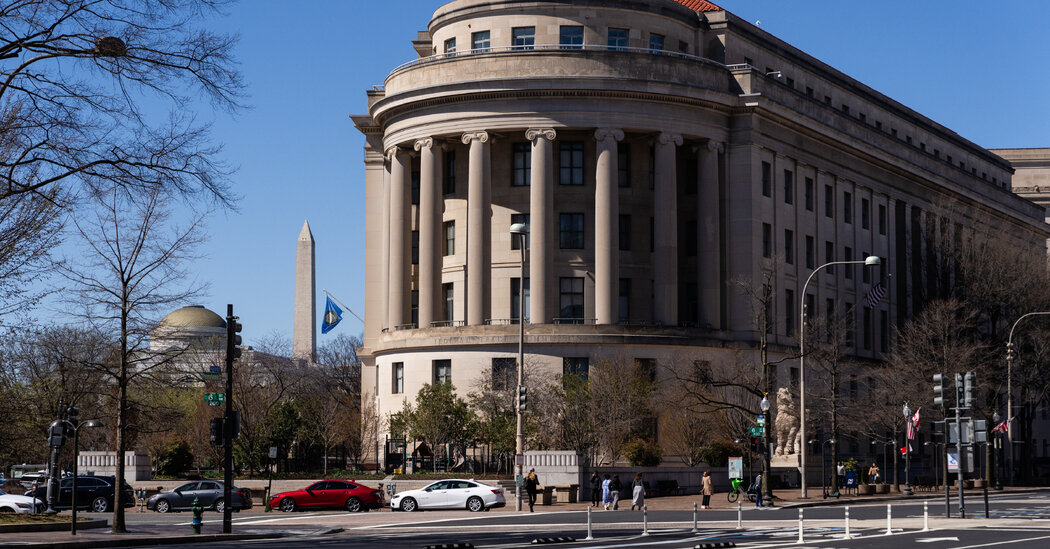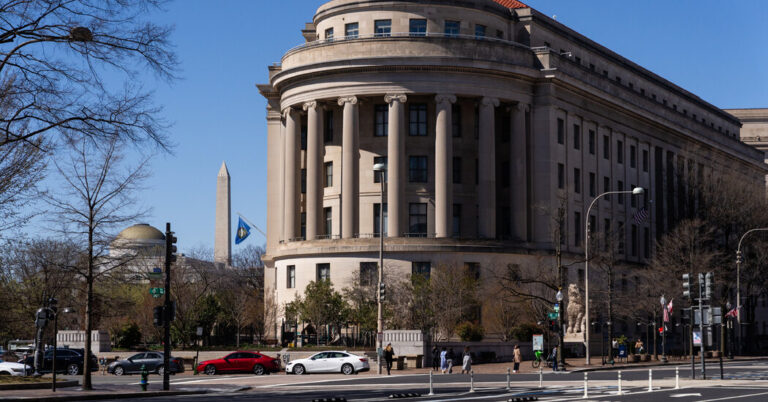Thursday two former democratic members of the Federal Trade Commission sued President Trump for his decision to fire them from the agency, accusing him of an illegal overcoming of executive power.
Trump fired the democratic commissioners, Rebecca Kelly Slaughter and Alvaro Bedoya, on March 18, in support of the consumer protection agency, which is generally managed by three members of the president’s party and two members of the opposing party.
In a case intended at the United States District Court for the Columbia district, the lawyers for Mrs. Slaughter and Mr. Bedoya claimed that the layoffs of Mr. Trump were without cause and violated the federal law. They mentioned a precedent of the Supreme Court of 1935 according to which the president could not fire members of the independent regulation councils exclusively for political disagreements.
“In short, it is the rocky substrate, binding that a president cannot remove an FTC Commissioner without cause,” said the cause. “The president’s action is indefensible pursuant to the government law.”
The White House, who did not immediately respond to a commentary request, previously said that “President Trump has the legal authority to manage the staff within the executive branch”.
The cause was the last legal battle to explode for the attempts of Mr. Trump to expand the power of the presidency. In recent months, in many cases, more than 50 judicial judgments have temporarily interrupted, ranging from its aggressive position on the deportations to its dismissal of public employees.
The legal battles also influenced the regulators that the congress created that they are independent of the direct control of the White House. While the regulators are appointed by the president, many traditionally have a great latitude to determine the direction of their agencies.
But Mr. Trump previously fired Gwynne Wilcox, a democrat at the National Labor Relations Board, who was restored by a federal court this month. The administration appealed to this sentence.
Trump also signed an executive order last month that hit the FTC, the Securities and Exchange Commission, the Federal Communications Commission and the National Labor Relations Board. The executive order has commissioned these agencies to present a revision of the White House proposed to the White House, as well as declaring that they must accept the interpretations of the law made by the President and the Department of Justice as binding, among other measures.
The cause of Mrs. Slaughter and Mr. Bedoya also appointed the two republican commissioners of the FTC – its president, Andrew Ferguson and Melissa Holyoak – as defendants. They also appointed the executive director of the David B. Robbins agency.
The 1914 law that established the FTC states that the commissioners can be removed from the Council of five members for “inefficiency, negligence of duty or malfunction in charge”. The Supreme Court strengthened those protections in the 1930s when President Franklin D. Roosevelt tried to fire an FTC member
In a letter sent on behalf of Trump last week who informed one of the commissioners of the resolution, the White House said that the protections established by the Supreme Court sentence did not apply to those who led the FTC today.
Ferguson declared in a statement from last week that he has no “doubts” about the president’s constitutional authority to remove his colleagues. The FTC did not immediately respond to a request for comment on the cause.
In the case, the lawyers of Ms. Slaughter and Mr. Bedoya said that the two were “denied access to their offices” and now they have been listed as a former commission members on the FTC website. Their staff was also put on administrative leave, according to the cause.
The FTC has been responsible for some of the major rendering of the accounts between the corporate America and the federal government. In April, the agency should face Meta, the owner of Facebook, Instagram and other apps, in an antitrust test on the fact that the technological giant has illegally suffocated nascent competitors when he purchased Instagram and WhatsApp.
The FTC also filed legal actions against Amazon, claiming that it has made it difficult for consumers to cancel its privileged subscription service and squeezed small traders who use its site.
Under Mr. Ferguson, the agency has increasingly focused on the power of large online platforms on speech and speech. Last month, the agency began to solicit comments from people and business who said that their posts were removed improperly by social media sites.





